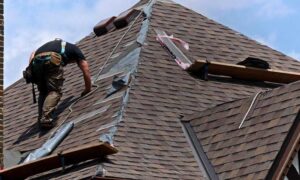The world of roofing is diverse and complex, with distinct differences between residential and commercial roofing practices. Both residential and commercial roofers play essential roles in maintaining the integrity and safety of buildings, yet their skills, materials, and approaches vary significantly. This article aims to highlight how a residential roofer differs from a commercial roofer, delving into aspects like the scope of work, materials used, design considerations, and the skills required.
Scope of Work
Residential Roofing
Residential roofers specialize in installing, repairing, and maintaining roofs on houses and smaller residential buildings. Their work typically involves:
- Smaller Scale Projects: Residential roofing projects are generally smaller in scale, focusing on individual homes.
- Personalized Service: More direct interaction with homeowners, offering personalized solutions.
- Aesthetic Considerations: Emphasis on the aesthetic aspects of roofing materials and design to complement the home’s architectural style.
Commercial Roofing
Commercial roofers, on the other hand, handle roofing needs for businesses, industrial buildings, and large complexes. Their scope of work includes:
- Large Scale Operations: Handling larger, more complex roofing projects for commercial buildings.
- Industrial Requirements: Meeting the specific needs of industrial or commercial facilities.
- Functional Prioritization: Focusing on the functionality and durability of roofing to accommodate larger buildings.
Materials Used
Residential Roofing
Residential roofers work with a variety of materials, such as:
- Asphalt Shingles: The most common residential roofing material, known for its cost-effectiveness and versatility.
- Tiles: Clay or concrete tiles are popular for their aesthetic appeal and longevity.
- Metal Roofing: Gaining popularity for its durability and energy efficiency.
Commercial Roofing
Commercial roofers use materials suited for larger, flatter roofs, including:
- Single-Ply Membranes: Such as TPO, PVC, and EPDM, known for their durability and ease of installation on large surfaces.
- Built-Up Roofing (BUR): Layered roofing that provides added protection for commercial buildings.
- Metal Panels: Used for their longevity and ability to withstand harsh conditions.
Design and Installation Considerations
Residential Roofing
Residential roofing is often characterized by:
- Steep Slope: Most homes have steeply sloped roofs, requiring specific installation techniques.
- Aesthetic Customization: Greater emphasis on the design and aesthetic appeal.
- Simpler Drainage Requirements: Due to the roof’s slope, residential roofs have simpler drainage systems.
Commercial Roofing
Commercial roofing projects involve:
- Flat or Low Slope Roofs: These require different installation techniques and materials.
- Complex Drainage Solutions: Flat roofs need more complex drainage systems to prevent water accumulation.
- Additional Features: Incorporating features like external piping, air conditioning units, and smokestacks.
Skills and Expertise
Residential Roofing
Residential roofers are skilled in:
- Customized Installation: Tailoring roofing solutions to individual homes.
- Detail-Oriented Work: Focusing on details that enhance the home’s aesthetic.
- Customer Interaction: Communicating effectively with homeowners.
Commercial Roofing
Commercial roofers possess:
- Technical Knowledge: Understanding the complexities of commercial roofing systems.
- Project Management Skills: Handling larger teams and coordinating extensive projects.
- Safety Compliance: Adhering to strict safety standards due to the scale and complexity of projects.
Conclusion
While both residential and commercial roofers share the common goal of providing effective roofing solutions, their roles, skills, and methodologies differ greatly. Residential roofers focus on smaller-scale, personalized projects with an emphasis on aesthetics and homeowner preferences. In contrast, commercial roofers tackle larger, more complex projects, prioritizing functionality, durability, and adherence to industrial standards.
Understanding these differences is crucial for anyone looking to hire a roofing professional, ensuring they choose the right expert for their specific roofing needs. Whether it’s a cozy home or a sprawling commercial complex, the right roofer can make all the difference in protecting and enhancing the value and safety of the property.

































